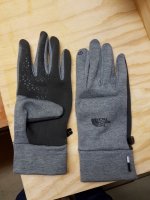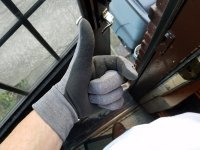ear3
Member
- Joined
- Jul 24, 2014
- Messages
- 4,341
I imagine others are similar, but i rely a a tremendous amount on tactile sensation with all aspects of carpentry, and have always found it difficult to intolerable to wear gloves while in the shop. But this is responsible for a fair amount of misery in the winter months (my shop is unheated), or even foregoing woodworking altogether on excessively cold days, since my poor circulation causes my hands to go numb at the right temperature.
Watching some football recently it struck me that the gloves used by quarterbacks and receivers might be a viable alternative to the gloves you find at home centers -- I mean, if the guys who are making mIllions of dollars from their hands are willing to entrust that to a pair of gloves, then that should be good enough for my woodworking.
So I went over to dick's sporting goods next to my local home depot and browsed their football glove section. Unfortunately I found that most of them had a coating that was too stiff for me (though they were out of stock of some others that looked more promising, and which maybe I'll look into in the future). But then I went and looked at the rack of their generic sport outdoor gloves, and I ended up getting this pair of North Face ones, called e-tip, because they enable use of touch screen phones ( in fact, I'm typing this whole thing on my phone wearing the gloves).
So far they are brilliant. I've warn them while operating the table saw, the miter saw, drilling, sanding, and assembly. I can almost -- not quite but almost -- even roll a cigarette with them on, which should give you some idea of how much delicate tactile sensation they permit. Since they are only rated for moderately cold weather, I will have to see how they protect my hands in truly cold temperatures. But so far I'm really really pleased.
The only downside is cost. They were $45, which is more than I've ever spent on a pair of gloves in my life.
[attachimg=1]
[attachimg=2]
Watching some football recently it struck me that the gloves used by quarterbacks and receivers might be a viable alternative to the gloves you find at home centers -- I mean, if the guys who are making mIllions of dollars from their hands are willing to entrust that to a pair of gloves, then that should be good enough for my woodworking.
So I went over to dick's sporting goods next to my local home depot and browsed their football glove section. Unfortunately I found that most of them had a coating that was too stiff for me (though they were out of stock of some others that looked more promising, and which maybe I'll look into in the future). But then I went and looked at the rack of their generic sport outdoor gloves, and I ended up getting this pair of North Face ones, called e-tip, because they enable use of touch screen phones ( in fact, I'm typing this whole thing on my phone wearing the gloves).
So far they are brilliant. I've warn them while operating the table saw, the miter saw, drilling, sanding, and assembly. I can almost -- not quite but almost -- even roll a cigarette with them on, which should give you some idea of how much delicate tactile sensation they permit. Since they are only rated for moderately cold weather, I will have to see how they protect my hands in truly cold temperatures. But so far I'm really really pleased.
The only downside is cost. They were $45, which is more than I've ever spent on a pair of gloves in my life.
[attachimg=1]
[attachimg=2]


